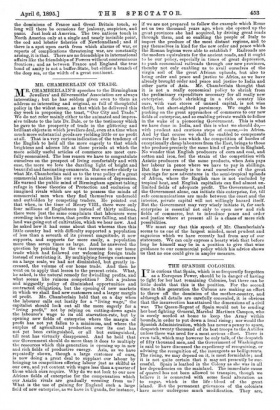TOPICS OF THE DAY.
GREAT BRITAIN AND FRANCE.
WE entirely agree with those who assert that our present relations with France are most unsatis- factory and even a cause of danger. We cannot believe that the French Government is actually seeking a quarrel with us, because we cannot believe that the French people desire a war which could not restore their lost provinces, or that the French Army is thirsting for a struggle in which only the Navy could even hope to acquire glory. It is, however, certain that the irritation of the French governing classes, especially the journalists, is excessive, that it meets us in every corner of the world, from Con- stantinople to the New Hebrides, and that it hampers us both at home and abroad ; at home, by compelling the Treasury to expend millions on what are really prepara- tions for war, and abroad, by embarrassing and misdirect- ing our efforts at colonial expansion. The French, for example, do not really want Madagascar, which they will find it most burdensome to garrison, while we could hold Madagascar with a force of Zulu Sepoys ; and if the two nations had been cordial, a compromise as to ascendency in that island could easily have been arranged. It is French hostility which wearies and perplexes us in the Nile Valley, where, in the end, we must recover the Soudan ; which makes projects for the exploitation of the Lake Region so risky, the necessary railways becoming comparatively worthless if we lose the Nile ; which worries us in the Valley of the Niger, where our Chartered Company and the French expeditions are always glowering at one another ; and French suspicion which renders the question of Morocco so troublesome and dangerous. France is, after all, the only country we have to be constantly thinking about, and France is the only one of which we habitually, sometimes even accidentally, set the nerves on edge. Yet all this while we desire nothing of France, no inch of her territory, no trade con- cession, no suspension of her project of building up a great Colonial Empire. At the utmost, we ask that that Empire, for which there is plenty of room, should not be built in such a way, or in such places that it must of necessity interfere with the expansion of British territorial ascendency in savage lands.
We cannot but believe that a compromise with France is possible, and that diplomacy could arrange one ; but to allow diplomatists even to commence the task, it is in- dispensable that our countrymen should understand the French case, which on some sides they do not fully grasp. The French firmly believe that they could be a great Power beyond seas,—not indeed in the English way of colonising, for which they have neither the population nor the habit of emigrating, but in the way of holding and governing great tropical or semi-tropical dependencies. For this work they hold themselves to be incontestably the best qualified of all peoples. They believe that we arrested them in a splendid career in India, and that we are now repeating that act of unfriendliness in Africa. That vast continent is now in the melting-pot, and they think, to put it plainly, that Great Britain has "taken advan- tage" of their momentary inferiority in Europe, to cheat them of their fair share in the grand distribution. They have not only not got Egypt, which with their Napoleonic traditions they hoped for, but they have got nothing else except a quantity of rather thinly covered soil, as Lord Salisbury said, and liberty to conquer Madagascar, if the Hovas will only let them. That is not sufficient, and they are angry, not only in Egypt, but in Madagascar, in the Somali country, on the Niger, and in the vast region behind their possessions on the south coast of the Mediterranean. Incredible as it may seem, it is really true that they think we are intriguing to keep them out of the vast provinces forming the" Hinterland "of Algeria and Tunis, provinces which, we believe, our countrymen would reject if they were assigned to their guardianship by a unanimous European vote. We have, we may venture to say, no more desire for Lake Tchad than for any one of the great craters which the telescope reveals upon the moon. It is not that the French want Egypt so much, for most of them know they cannot have it without a war, for which it would not be adequate compensation, but that they want sornewhern or other in Africa or Asia, the share of the tropical world out of which they have been, as they conceive the situation, shamefully done. Of course many constituent portions of their general view are unreasonable, and could be disproved on paper, but still this is the French view, and unless it is fully recognised, a cordial agreement cannot by any possibility be arranged. It will be well, too, if Englishmen recognise that in part the French statement is true, that is to say, that unless Madagascar is to be taken as already and easily conquered, which is not quite fair, the share of Africa obtained by the French is far inferior in value to the share obtained by the British, and not equal to the position which they claim among the Powers of the world. If Madagascar is thrown in, the ease is materially altered. But then they may not get Madagascar, or may get it only after a war so expensive as seriously to reduce the value of the prize.
Under these circumstances, as it seems to us, the very basis of the arrangement which diplomatists should seek, is compensation to France in Africa so liberal, that she shall have no further ground for jealousy ; and the true question for the two Cabinets to consider is whether such compensation is, or is not, possible. We are inclined to believe that it is, if we on our parts can make up our minds to set some sacrifices against some gains. Clearly,. what we with our Asiatic position require, is permission to reign in Eastern Africa, to turn that section of the great continent into a, new India. We cannot do this without aid from India, especially in the way of soldiers and emigrants ; and we want, therefore, the side which is easily accessible from India without a passage through the Suez Canal. The French, on the other hand, for reasons connected with their conscription, with their habit of allowing representation to their "Colonies," and with the reluctance of their people to go far afield, want their dependencies to be near them, to be, as it were, within sight of France. If they are to govern a portion of Africa* it must be on the North, which they already occupy, and the West, in which they are already seated at Dahomey. Then why should they not have what would so obviously suit them ? In other words, if they are willing to resign all claims in Eastern Africa from the Mediterranean to the Cape, including Egypt and Madagascar, why should we not resign all claims to the North and Westward, including the Hinterland of Tunis. andAlgeria, as much of Morocco as they can obtain by a transaction with Spain, and the whole of Western Africa to the Equator, including the Valley of the Niger ? Compensation could easily be provided for the claims of the Niger Company, and each State would then be pro- vided with a magnificent and continuous African Empire, the French one resting on a splendid base, Algeria, the British one resting at once on Egypt and on India. The two Empires would not touch at any point, and would not threaten each other at any point, and each could then devote itself, in peace and at leisure, to opening up new regions by light railways, and to introducing civilised order, which is also commercial order, among its subordinate black populations. Each could try fairly its own system of government, and each, relieved of incessant suspicion, could devote the whole resources of its grand dependency to the advantage of its populations. We are quite aware that diplomatists will say the scheme is "terribly broad," that there will be screams from Spain, shouts from the Niger Company, curses in Arabic from Morocco, and shoals of protests from the many pecuniary interests that would be involved ; and we quite admit that some modifications in detail might ultimately prove to be advisable. But if there is to be a reconciliation between Great Britain and France capable of lasting a century, it must be based upon some broad scheme as to the partition of Africa; and if the scheme is to be broad, it must be settled upon the great principle that East Africa belongs to Great Britain, and West Africa to France. There is no other way in which the quarrel can be settled with any probability that the settlement will endure ; and if we were holding a conference after an ex- hausting but inconclusive war, the Ambassadors would discuss settlement practically from that basis. We want to avoid both war and the wretched bickering which has so many of the evil results of war without any of its "happy chances," and this cannot be effected by any petty agreement or temporary modus vivendi. As long as the dominions of France and Great Britain touch, so long will there be occasions for jealousy, suspicion, and panic. Just look at America. The two nations touch in North America only at a single and nearly invisible point, the cod and lobster fisheries off Newfoundland ; and, if there is a spot upon earth from which alarms of war, or reports of complications threatening war, are constantly arising, it is that. There are no friendships in international affairs like the friendships of Powers without conterminous frontiers ; and as between France and England the true bond of amity is not a buffer-State, but either a branch of the deep sea, or the width of a great continent.







































 Previous page
Previous page